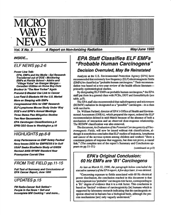News & Comment
Looking Beyond Overdiagnosis as
Tumors Continue To Surge

Monday, February 17, 2020
Last updated June 30, 2024
Genetic Susceptibility and RF Radiation Modulate Thyroid Cancer

Tuesday, January 21, 2020
Unlike the Doubling Seen in England

Friday, December 13, 2019
First NY Times, Now Scientific American

Friday, December 6, 2019
Last updated February 19, 2020

